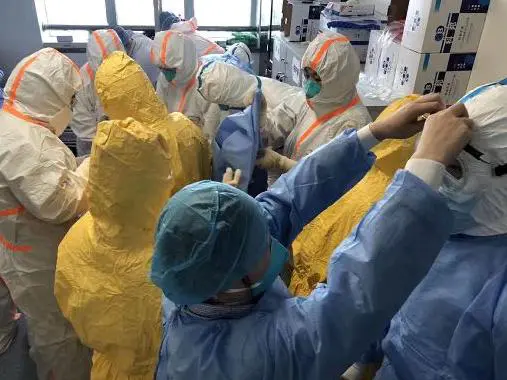Editor's note: China, the most populous country with 1.4 billion people, is in a "smokeless war" against the novel coronavirus. Hundreds of millions of people in and outside China are doing their best and most to help curb the virus from spreading. Some are hailed as heroes in harm's way, more are working non-stop.
Xinhua has invited volunteers from various trades to share their own stories. Though some narratives may not be professional, they are one of the most original live records about how Chinese people have been through the troubled days.
by Xinhua writers Ma Yunfei and Liu Jingyu
Gao Xiaoling never gave her father a second video call. She regretted making the first, in which the 90-year-old, always a tough guy in front of his daughter, cried his heart out.
Without telling her old man the truth on the very day she was told in the early hours to leave by noon for Wuhan, the epicenter of the novel coronavirus outbreak, Gao, a respiratory and critical care physician at the Second Hospital of Shanxi Medical University, led a medical team to the front line.
The first night in Wuhan was a sleepless one.
"I was up all night wondering what would happen when we meet our patients and whether my team members could protect themselves well," Gao said. The 50-year-old veteran admitted her anxiety, saying she had never had to deal with the fear of battling such a serious epidemic before.
Gao and her team were assigned to Tongji Hospital, where all 50 beds were filled with severe cases on the first day.
"In intensive care wards, we save lives and protect ourselves," she said, noting that it takes two hours to put on and take off the protective clothing, with more than 20 standard procedures.
Gao knows that masks, goggles and protective suits can offer better protection when the wearers encapsulate themselves, even with a feeling of suffocation. Yet they are definitely uncomfortable to wear.
"Blood-red marks were found on every face, some on cheekbones and some on nose bridges," Gao said.

Photo provided by the interviewee shows Gao's team members helping each other put on protective suits. (Xinhua)
Besides applying vaseline and using bandages or gauze pads, many become soaked in sweat, like taking a sauna inside their coveralls, especially her male colleagues, and they had to eat pickles to replace their lost electrolytes.
Every day after work, Gao and others followed strict disinfection protocols, soaking their clothes in disinfectant and rinsing them before a 30-minute hot shower, with water from the showerhead running as high as 56 degrees Celcius.
"It was like being tortured. I had to grit my teeth and bear the burning pain of such piping-hot water," Gao recalled.
Back in the wards, there were other things to worry about, like taking risks carrying out tracheal intubation for patients with dangerously low blood oxygen levels, as well as cycling around the city in a raging storm from one drug store to another just for a patient who clamored for a particular brand of hypertension medicine.
"Some patients had their anxiety and fear intertwined inside after witnessing deaths, and it was our job to comfort and help them build confidence," Gao said, gratified to not see a single death reported by her team so far.
Gao said she slept well every night after a long day of hard work. However, her husband began to suffer from anxiety and insomnia. "No matter how late it was, even at 2 or 3 a.m. when I left a message on WeChat, he would reply in seconds."
A mother of a high school daughter herself, Gao remembered her daughter persuading her to sign up for the rush-to-rescue before the large-scale outbreak of the epidemic, who could not stop crying in a video chat days later after realizing how dangerous it might be on the front line.
Gao received regular greeting messages every day from relatives and friends, even from those who do not contact her often. She was touched by the hot meal sent by hotel staff after midnight, and the clothes and daily necessities donated by caring hometown supporters who expect her triumphant return.
Tears welled in her eyes when one day Gao checked the phone and saw a WeChat message left by her dad that read "afraid of looking at you in the eye, only to hide under covers wiping mine."
"He and mom said that they're so proud of me," Gao said.
 简体中文
简体中文

